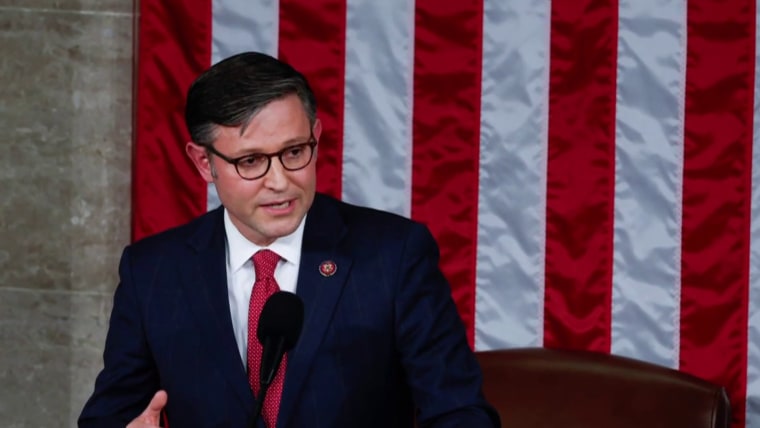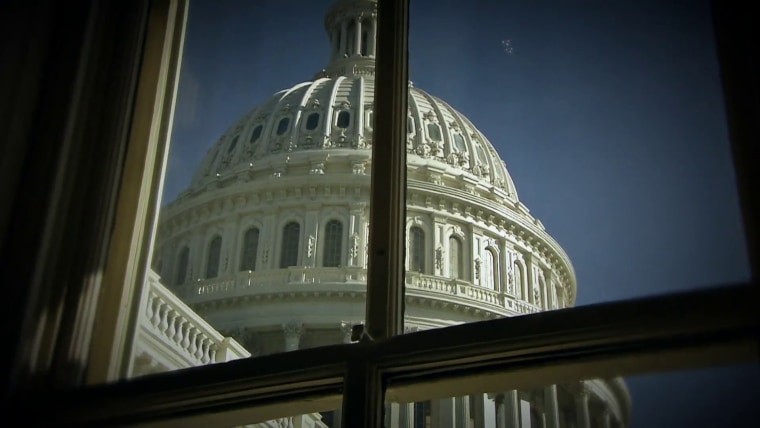The House of Representatives on Tuesday approved a short-term funding bill, forestalling the chance of a federal government shutdown this weekend. On one level, this is a win for Speaker Mike Johnson, R-La., as the first piece of major legislation to pass during his short tenure. On another, much more significant level, this is a win for House Democrats, whose united support saved the bill from a possible defeat without giving up anything real.
This is a win for House Democrats, whose united support saved the bill from a possible defeat without giving up anything real.
Even though the weird “laddered” resolution with multiple deadlines was its idea, the far-right House Freedom Caucus came out against the continuing resolution, or CR, on Tuesday morning. “Republicans must stop negotiating against ourselves over fears of what the Senate may do with the promise ‘roll over today and we’ll fight tomorrow,’” the group said in its statement. At the same time, even though it’s a Republican bill, House Democratic leadership issued a statement Tuesday afternoon throwing its support behind it.
And it’s a good thing it did. The parliamentary maneuvering from Republicans to avoid another potentially messy loss on the floor meant that the bill needed two-thirds of the House’s support to pass. It cleared that threshold handily, 336-95, with Democrats providing the lion’s share of those votes. All told, 93 Republicans voted against the bill, or nearly half of the caucus as a whole.
We’re here because the federal government technically ran out of money on Sept. 30, as none of the annual appropriations bills had passed into law. Instead, Congress, at the last minute, passed an extension of the previous fiscal year’s funding that would keep the status quo in place until Friday. Most of the time after that got eaten up in the House GOP’s civil war that saw former Speaker Kevin McCarthy, R-Calif., toppled and Johnson ascend.

McCarthy’s fall was, in part, a result of the GOP caucus’ steadily moving to the right over the last few decades. Now, many Republicans consider working with Democrats a mortal sin. That’s especially true for those who are more focused on conservative purity (and Fox News appearances) than on running the government. McCarthy was on thin ice after he’d negotiated a deal to raise the debt ceiling and set topline spending numbers with President Joe Biden in June. He later reneged on that deal under pressure from the far right, but the fact that September’s CR passed with mostly Democratic votes was the last straw for conservatives clamoring to oust him.
House Republicans have continued fighting among themselves while trying to pass the aforementioned appropriations bills. Several bills have had to be yanked from the floor before votes because of opposition from either the far right or the more moderate wing of the caucus. At no point have Republicans bothered trying to lure a few Democrats over with the promise of concessions that would make passing the bills easier.
That refusal to negotiate, even though the final bills will need to be agreed to in the Democratic-controlled Senate and signed by Biden, has rightly irked House Democrats. It has also presented the opportunity for them to sit back and let the public see how bad Republicans are at being in the majority these days. When McCarthy’s head was on the chopping block, Democrats opted not to save him, thanks in part to his willingness to abandon his deal with Biden.
Johnson came into the speakership facing the same problem McCarthy did: how to keep the government open long enough to get all 12 of the GOP’s spending bills passed with only Republican votes. His solution was to latch onto the proposal from the far-right House Freedom Caucus to split the funding in two, with half of it running out in mid-January and the rest in mid-February.
With 98% of the opposition to Tuesday’s CR coming from Republicans, it’s clear once again that only one party really cares about governing.
It’s a really “goofy” idea, to quote Senate Majority Leader Chuck Schumer, D-N.Y. It serves no practical purpose save to risk shutting down half of the government two weeks before the other half potentially shuts down. But beyond that, there was no real difference between this bill and one that the Democrats would have written themselves. It would keep spending at its current levels, which passed in December before Republicans took control of the House, without any forced cuts. It doesn’t include policy riders to restrict abortion access or fund more border security to ensure conservative support. And it would extend the farm bill for another year, forestalling any major changes to programs such as SNAP, also known as food stamps.
With 98% of the opposition to Tuesday’s CR coming from Republicans, it’s clear once again that only one party really cares about governing. In a more rational world, Johnson might take a lesson from this and thank his Democratic colleagues for their support. He might even start feeling out what sort of provisions Democrats would support in the final version of the spending bills.
What’s more likely, though, is that, to save face, Johnson pretends things would have worked out fine without Democrats. Well, he can have this one. The real fight remains ahead, and Jeffries knows his caucus has his back.
Johnson can’t say the same.

